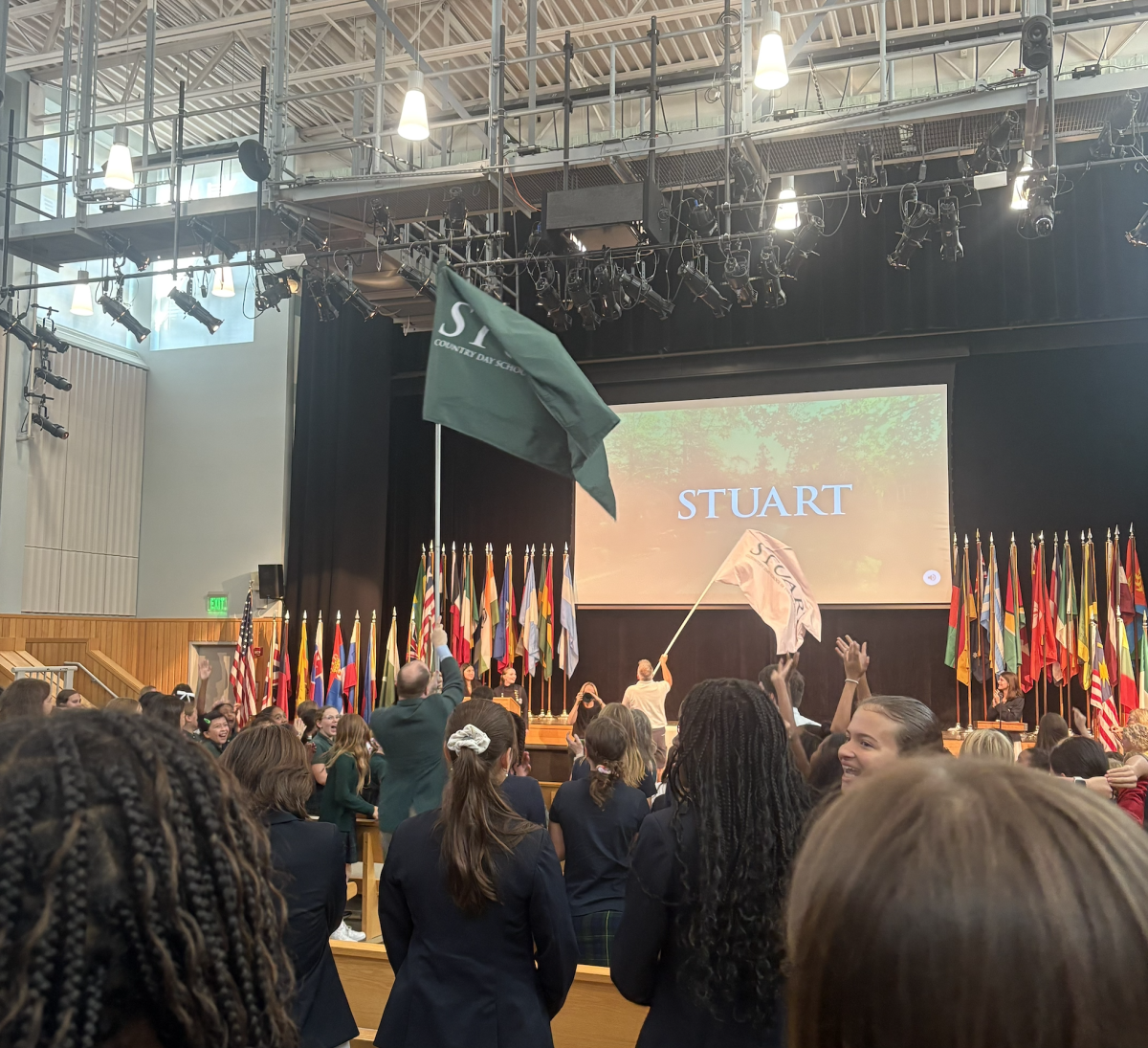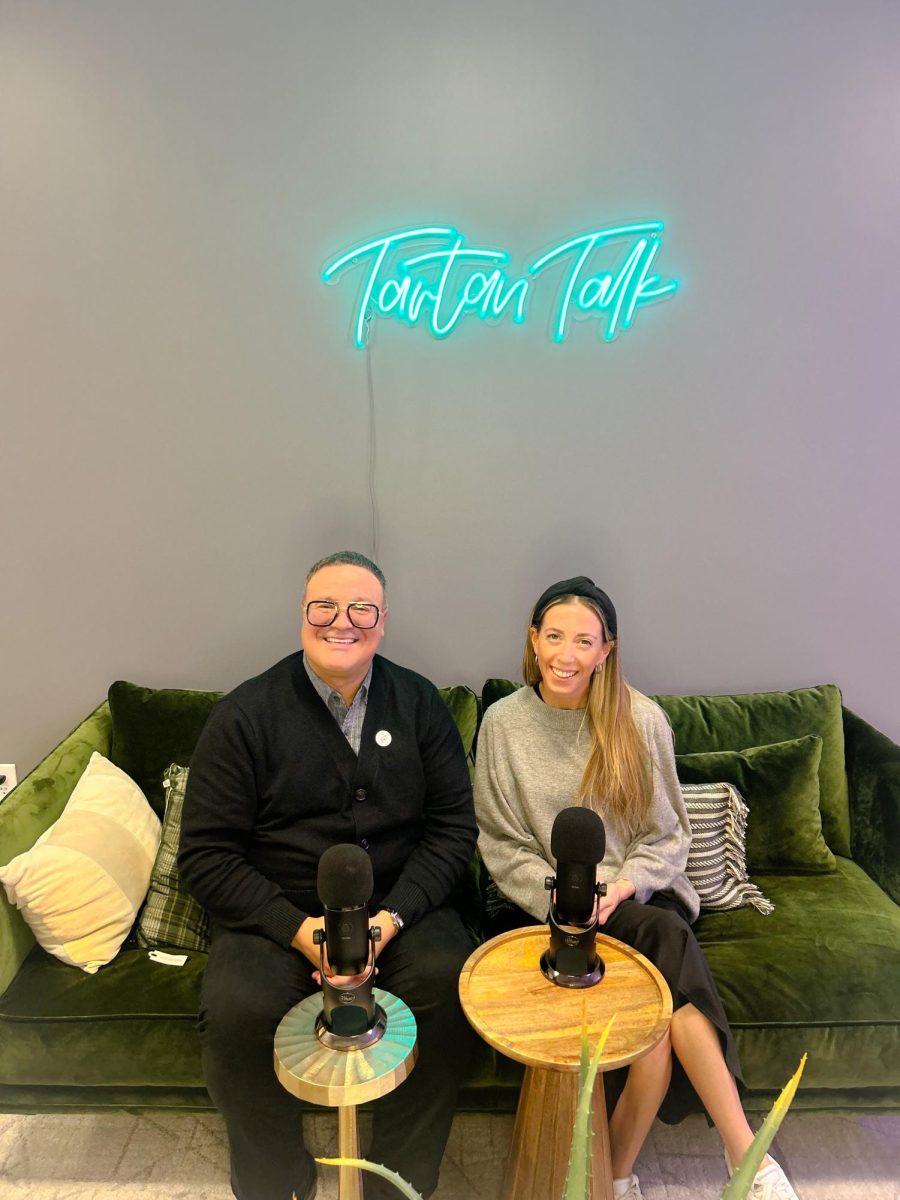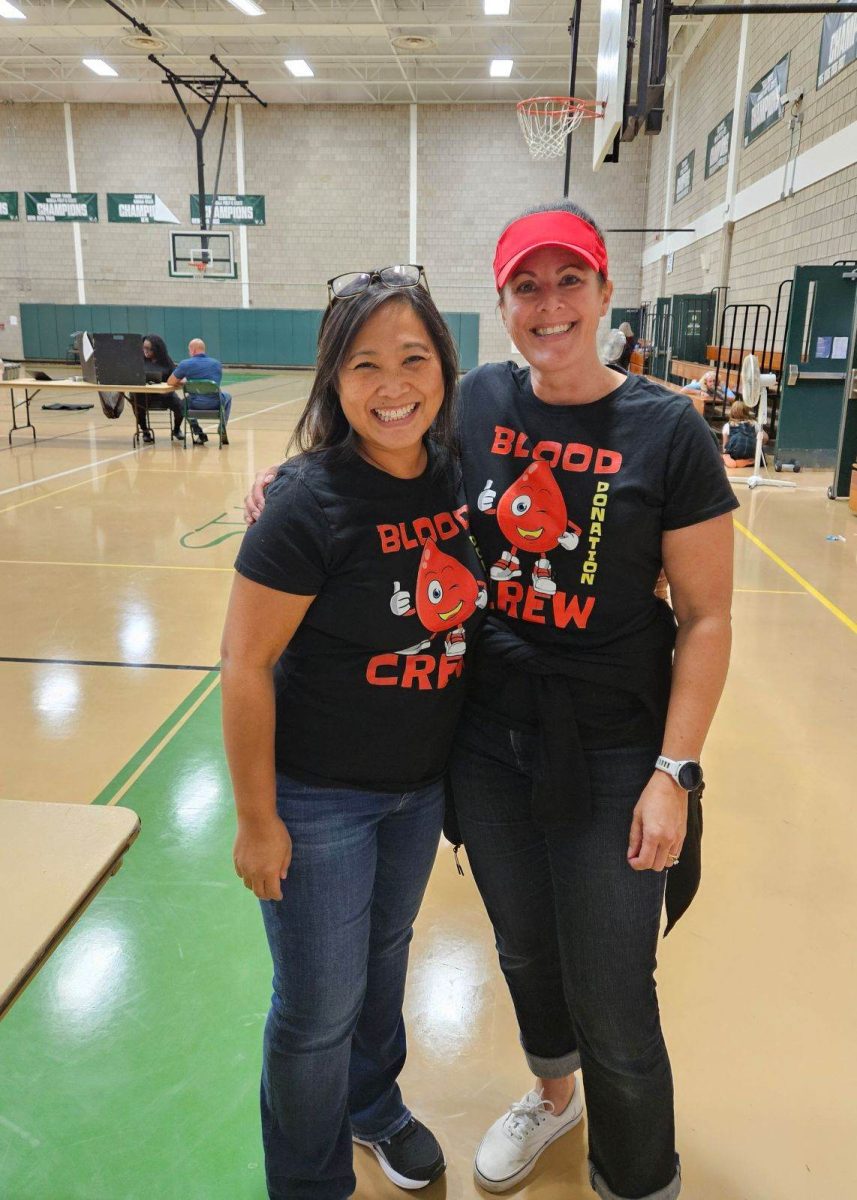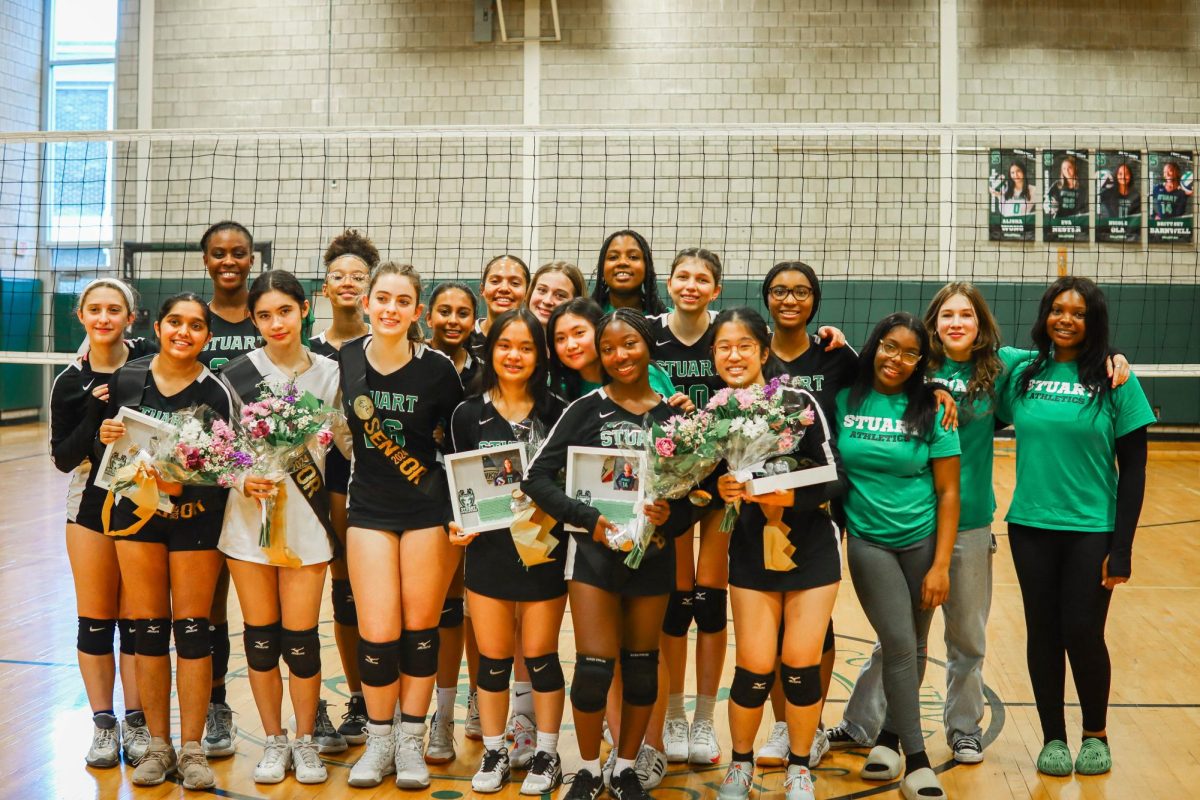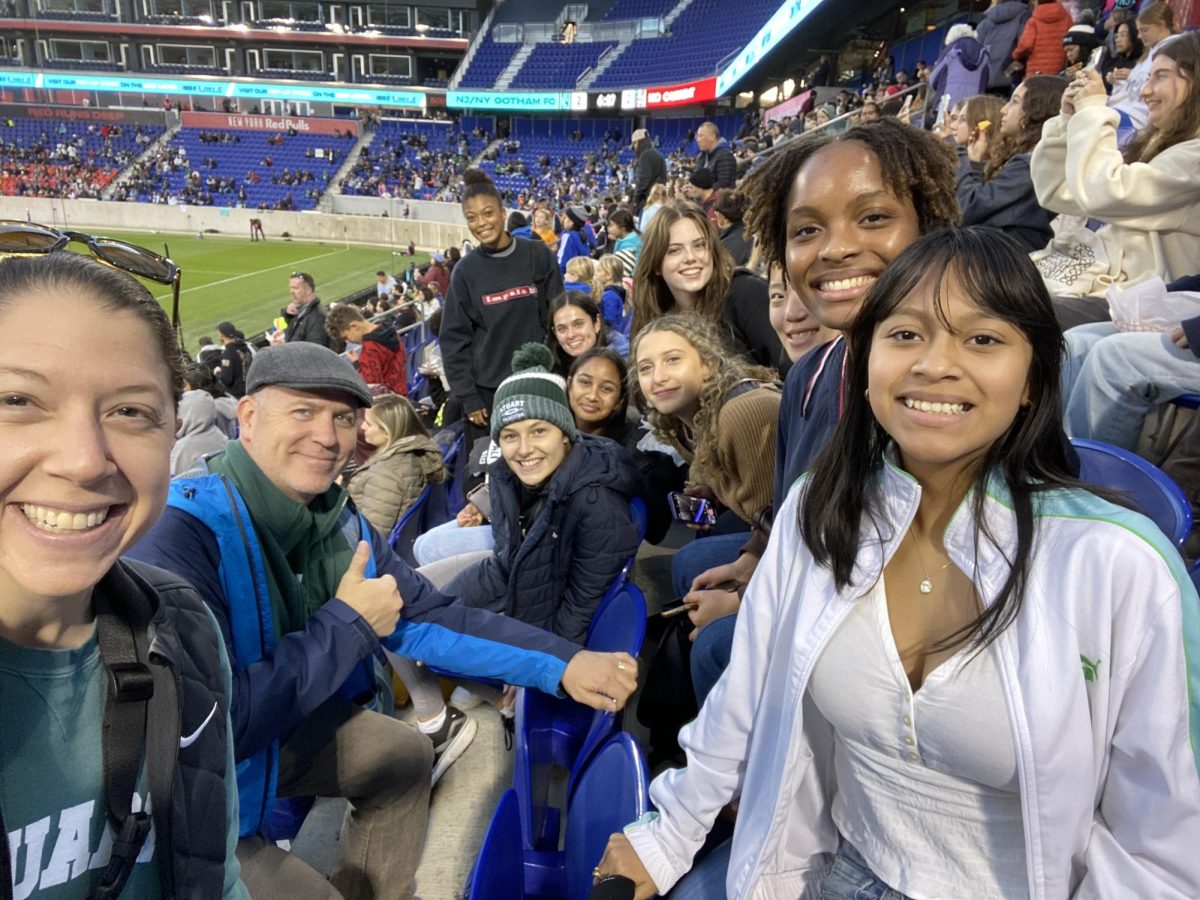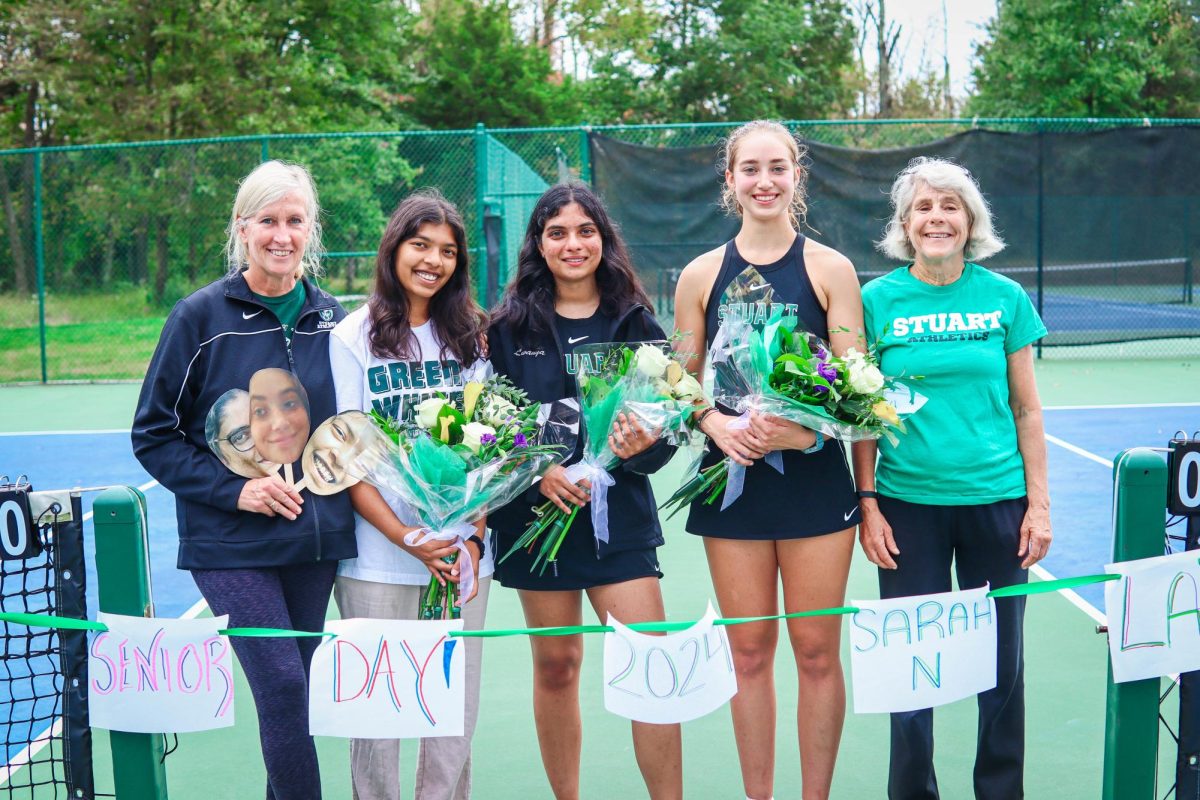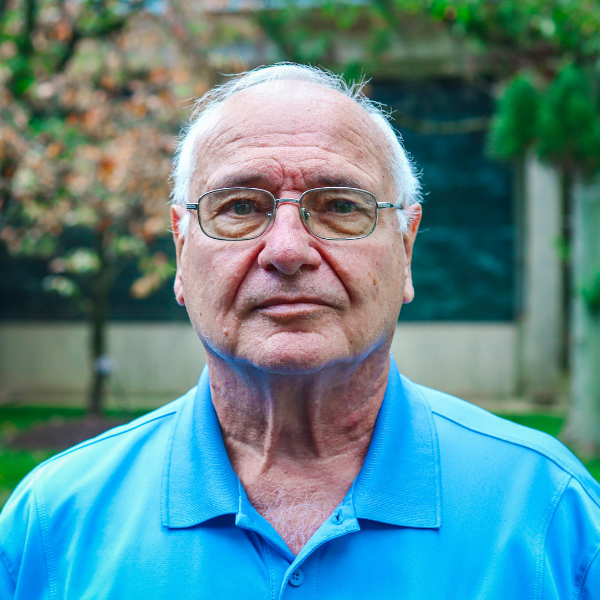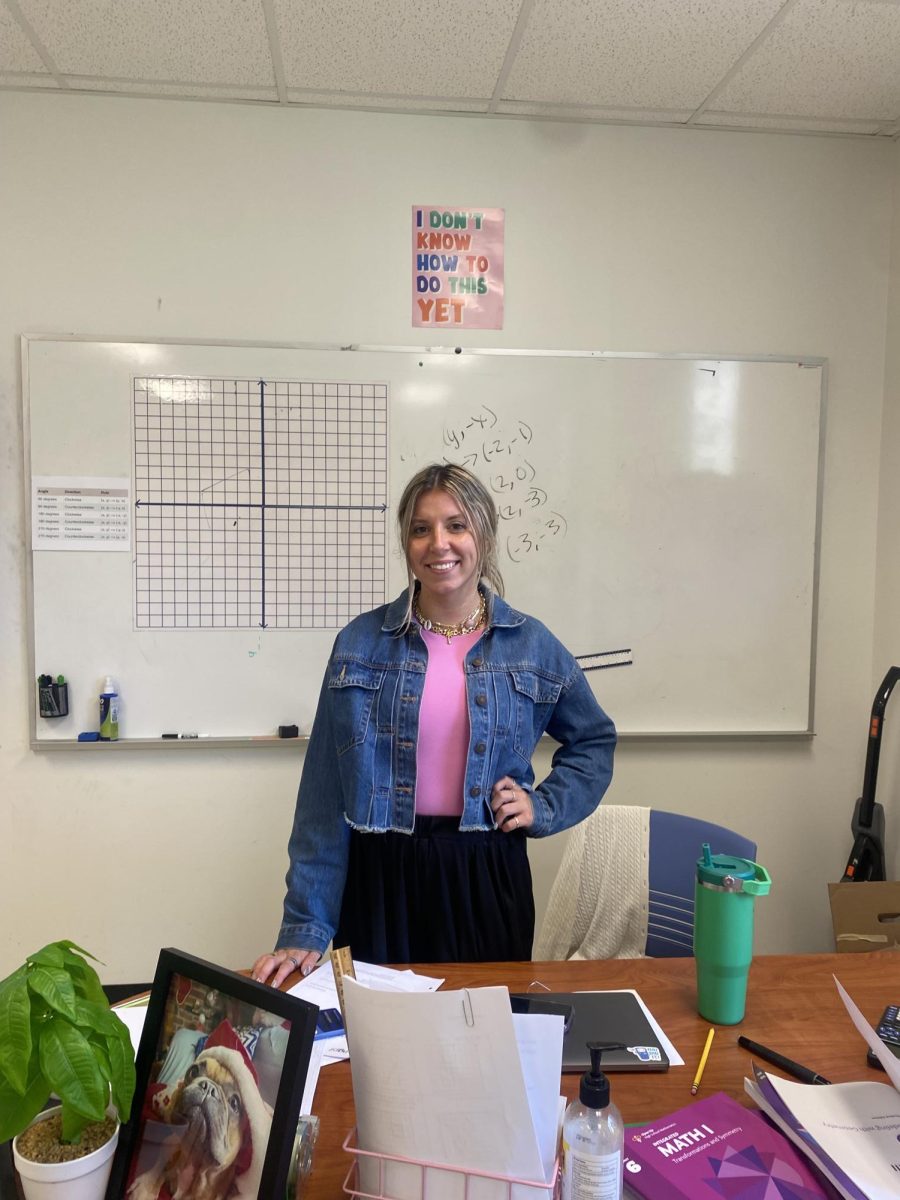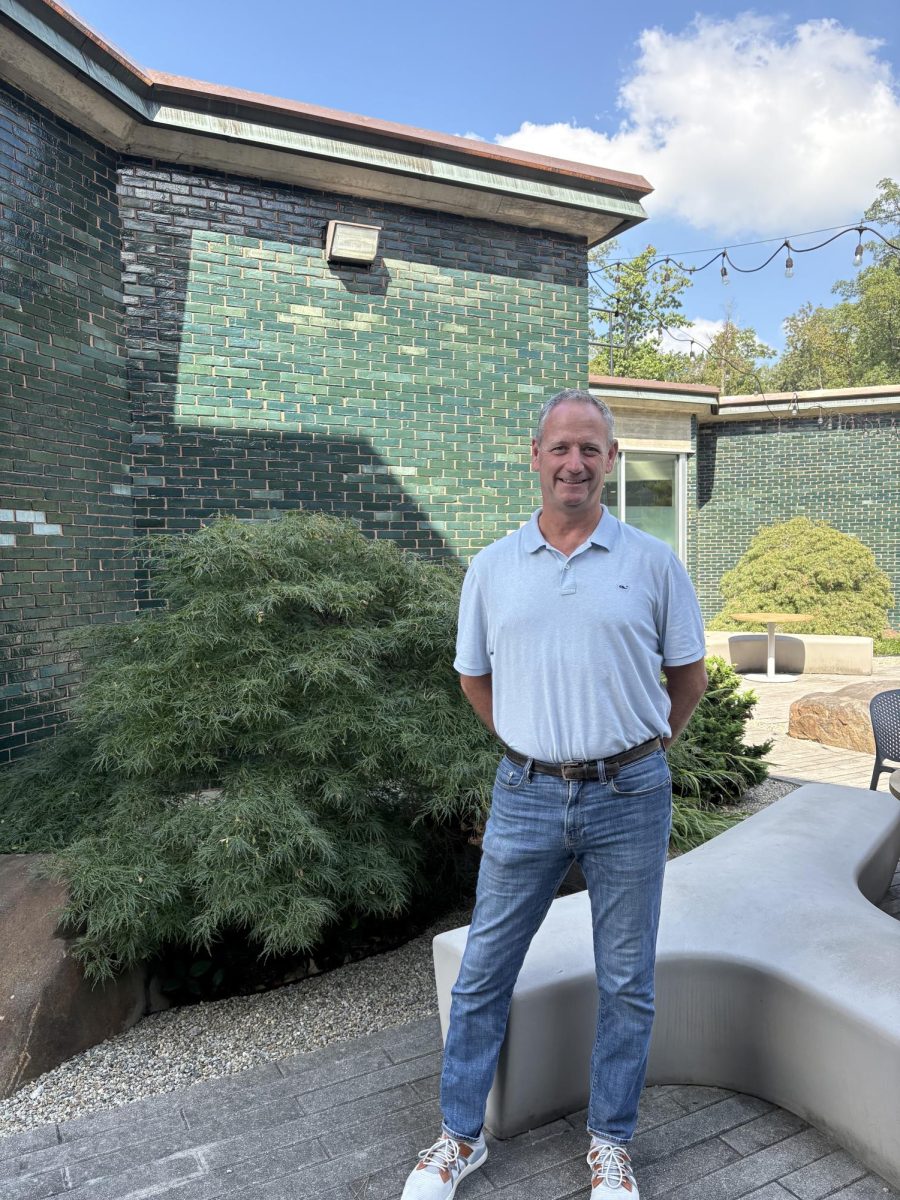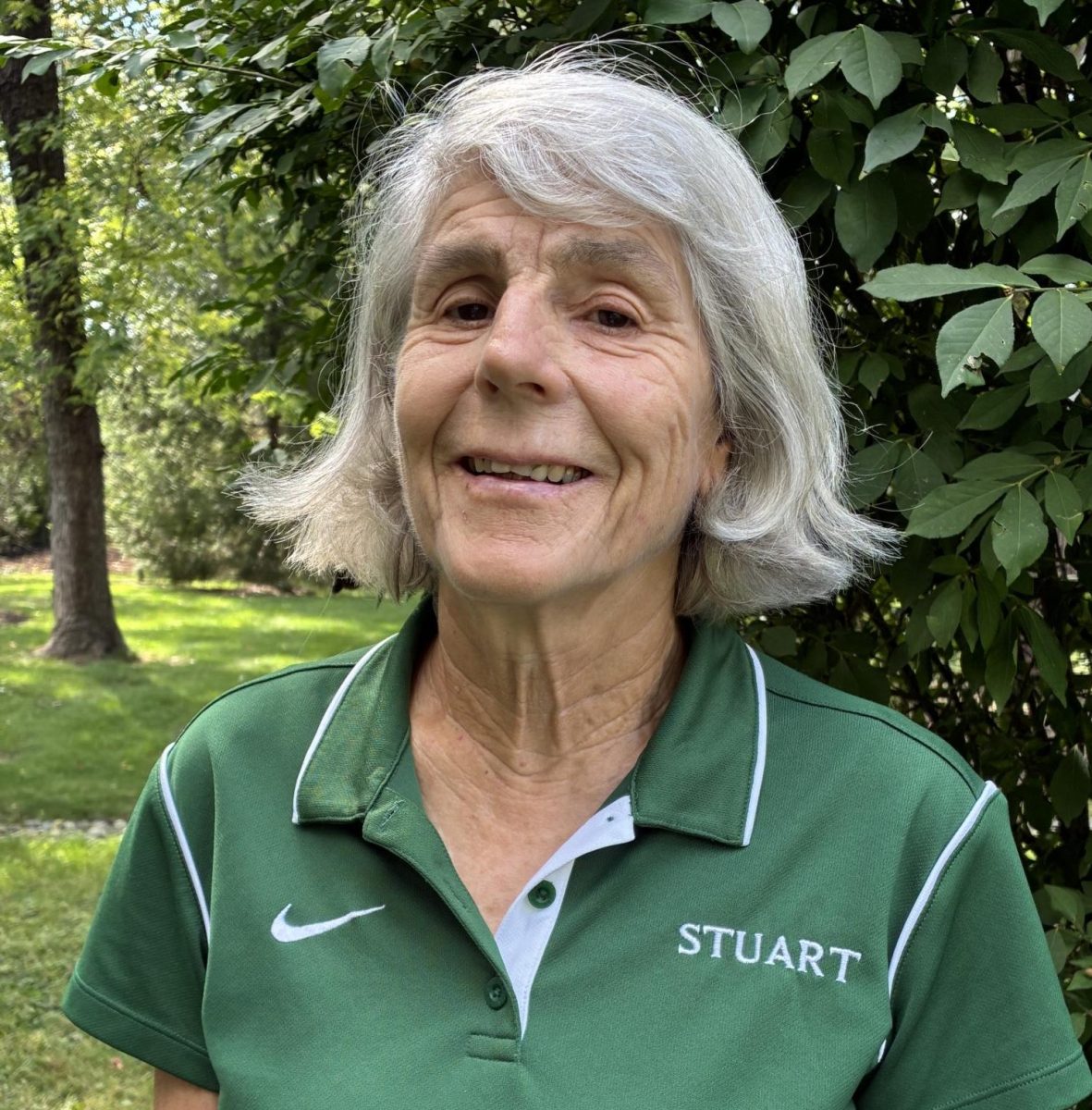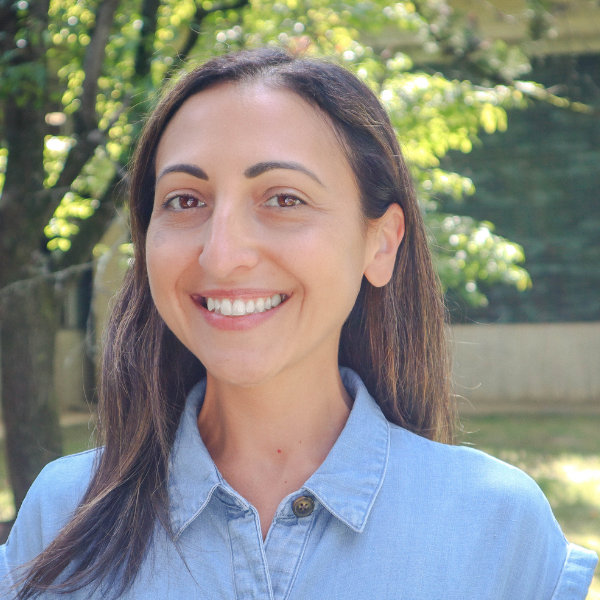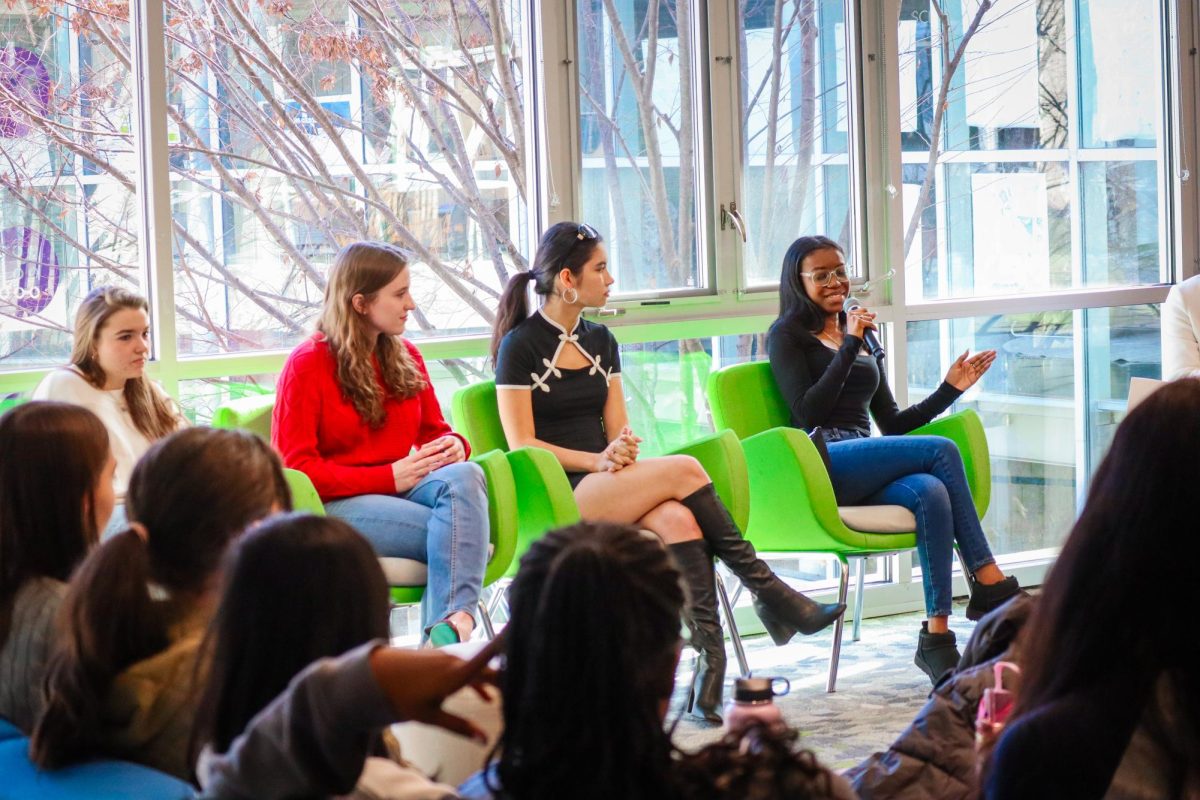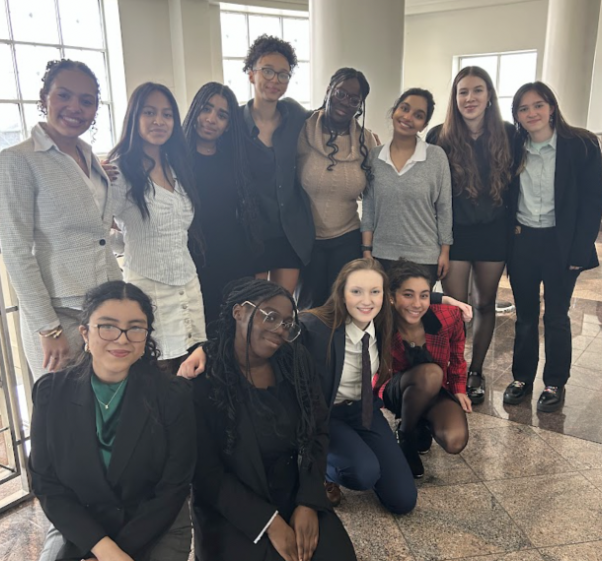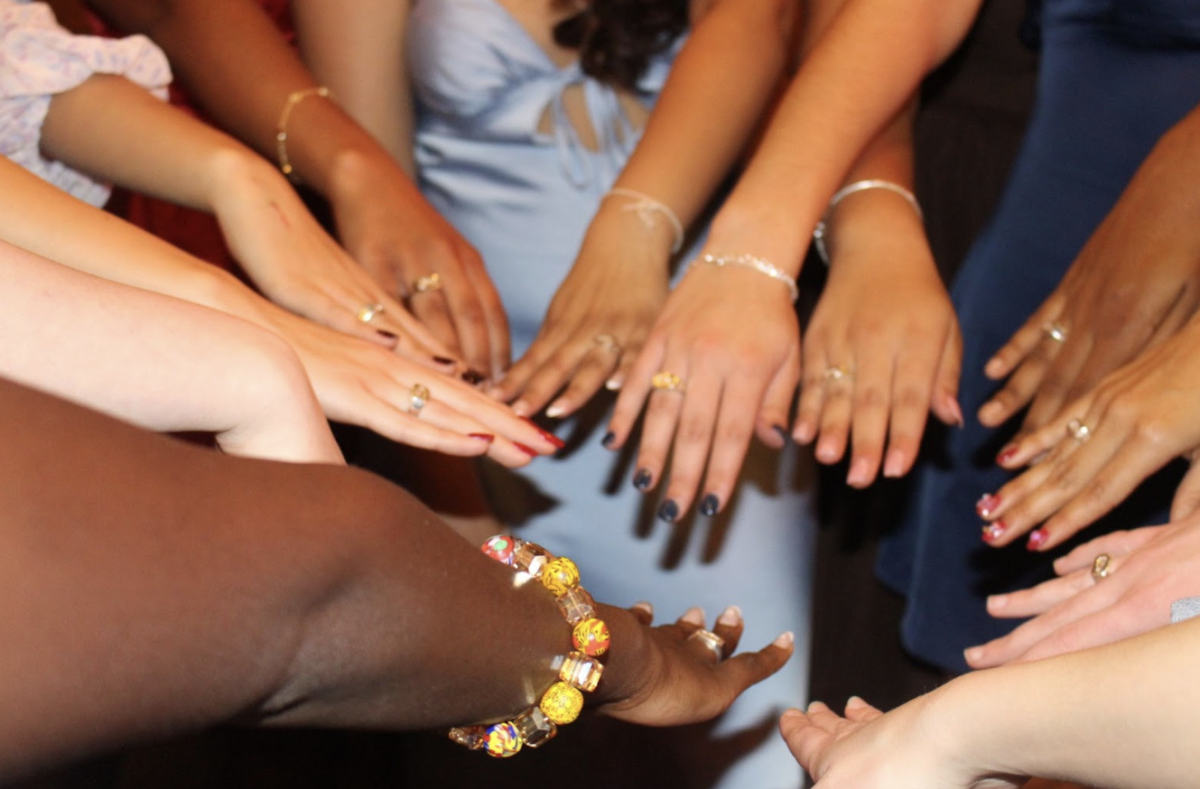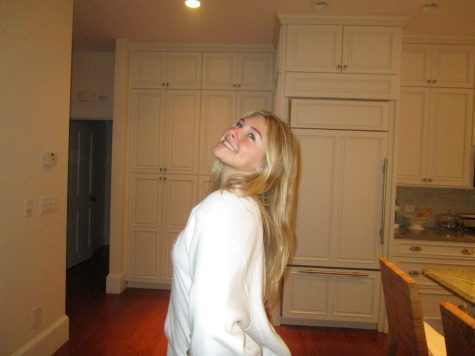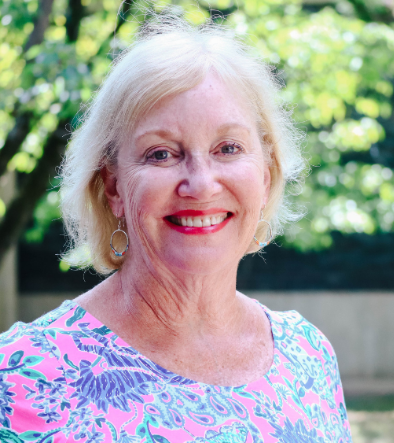 “I have a very funny story about how this all began,” Ms. Baldwin declares as she perches in her red armchair. Her office, its walls plastered with past school musical posters and stage props peeking through its windows, represents her theatrical personality perfectly. As I settle into her chair’s blue twin, I turn on my voice recorder, open my ears, and begin to listen.
“I have a very funny story about how this all began,” Ms. Baldwin declares as she perches in her red armchair. Her office, its walls plastered with past school musical posters and stage props peeking through its windows, represents her theatrical personality perfectly. As I settle into her chair’s blue twin, I turn on my voice recorder, open my ears, and begin to listen.
In her more than three decades at Stuart, Ms. Baldwin has instructed and inspired hundreds of students. She currently teaches middle and upper school drama, as well as upper school architecture, cinematography, graphic design, comedy, and photography. Outside of the Stuart community, she is a working Professional Actor and Singer and a member of the Actors’ Equity Association. She has directed four professional operas and over eighty plays and musicals at Stuart, including this year’s upper school musical, Mamma Mia!
C: Ms. Baldwin, thank you so much for sitting down with me to chat today. I’d love to begin with that funny story you mentioned. So, what made you want to teach at Stuart and when did you first start teaching here?
B: Okay, so, yes, I do have a very funny story about how this all began. I was in a production of The Sound of Music; I was playing Maria. And the director of the production was the drama teacher here at Stuart Country Day School. She told me, throughout the production, that she was about to move and go into another occupation, and she said, “You should apply for the job.” So, I applied for the job. I walked into Sister Joan Magnetti’s office on the day of my interview and she said, “Oh my goodness, you’re Maria!” She apparently had seen the production. She had an affinity for me because she thought that I was sort of a sister, a nun, by association because she herself was a sister at the Sacred Heart. We had a good laugh over that, and I said, “No, really, I’m Jan.” And that was that, the start of a true friendship and a lifetime career. I was hired, and my daughter joined me here. Quickly, as I learned more about the school and learned a great deal more about Sacred Heart education, the more I loved it. I have never left.
C: That’s great! Speaking of your daughter, how did her Stuart education benefit her?
B: My daughter Arielle still lives the Goals and the Criteria of the Sacred Heart. She is a very kind and loving woman who knows her own voice, who shares her passion with the world. She sees justice as a large part of her world. She has gone into many different fields; her degree is in Art History, amazingly, but she only pursued that for a little while after she graduated, but then, ultimately, she has become a part of the hospitality industry and works as a sommelier in the wine business out in Washington State.
C: So her education took her on this west coast adventure, but you stayed here at Stuart. Clearly, it’s a pretty special place for you. What have been some of your favorite memories as a teacher here?
B: All of my favorite memories revolve around how amazing our young women become. From the time that I see them, which is early on, fifth grade, until the time that they graduate, they become women who know who they are, who have a voice, who are willing to share their passion, who want to make a difference. They are kind, spiritually inclined, giving, but also are not willing to be rolled over.
C: What has kept you at Stuart all these years?
B: Again, it’s the kids. Our Goals and Criteria affirm the fact that everybody is a child of God and each girl has a unique personality and their own spark, inspires me every day to encourage them to become the authentic young women that they’re going to be when they face the wider world.
C: I’d love to chat a little more specifically about your particular areas of focus in your own teaching here at Stuart. Why do you think theater and the arts are so important to today’s education?
B: The world of the theater is a profound opportunity to walk in somebody else’s shoes and take the perspective of someone else so that you can be empathetic and understanding. It’s also a window into your own understanding of what passion, caring, and even relating to different kinds of emotions can be. If you have an arts education background, you have a greater window into creative problem solving, working for individual responsibility as well as group collaboration, working as a team– all of these are life skills that you’re going to take away from having a great education in the arts. But in terms of the theater, I think it’s profoundly the understanding of people and how they navigate their world
C: What is your favorite play that you’ve directed here?
B: That’s really hard to say. I think one of the top ten would be Hairspray. We had the baseball team from Ewing High School in the show because it was off season for them and one of the girls had a boyfriend who was on that team. So I ended up having this fabulous coed cast. I loved every minute of working on that production.
C: So we know that you are also an actor yourself, “Maria”; what’s been your favorite role as a performer?
B: I loved flying as Peter Pan because I got to be on wires, suspended in the air and singing at the same time. I also was in A Little Night Music, and I got a chance to waltz beautifully and sing beautiful music. And I loved playing Maria, I did it three times! The transition that she goes through from being a very naive young woman and being heartbroken to knowing who she is and falling in love with kids was obviously inspirational for me as a teacher. But I’ve also done some really hardcore roles where I was not a nice person, and taking that perspective was really interesting for me as well. That would be very much the opposite of who I am as a person and whom I would normally be cast as. I’m never really the villain, but playing a villain was fun for me.
C: You definitely don’t seem like a villain.
B: [Laughing] No, no, no, but it’s kind of nice to play that side occasionally!
C: Well, in terms of your personality, can I ask about your childhood self? How would you describe yourself as a child? Did you always want to act and teach?
B: I was always an actress and a musician. I sang from the time that I was very little, my mom was also an actress, I was on stage as a baby, in a production of The Tender Trap with her, and went on from there. Throughout all of middle school and high school I was performing or singing. I would create plays in my backyard and invite all the neighborhood kids to be in them, so I think I was also a director, even at seven. I did not think teaching was what I wanted to do, and yet the first time that I stood in front of a group of young students it became something that I just fell in love with, and I’ve never left. I let them do the work, I hope I’m just an inspiration and a coach, and a mentor for what they ultimately will create.
C: Who did you look up to as a child?
B: I think when I grew up we had a lot of really great people to look up to, not the least of which was my immediate family My mom, of course, and my big sister, She was 5 years older than I was, and sort of carved my path by taking leadership roles, and I saw how she navigated that world. She was also very involved with social justice issues. This was the 60s, my friend, so following in my big sister’s footsteps was also really easy. She also became an opera singer! Other influences are my grandparents. For me, inspiration was always familial, not so much political leaders. Most of them were men back then, anyway, and I wanted to more clearly see myself in whom I looked up to.
C: And who do you look up to now?
B: I have a great group of friends and colleagues here at Stuart. I look to other people for collaboration and understanding. I look not necessarily “up” to people, but “with” people at this point in my life. I have reached that stage where, I hope, I feel secure in who I am, so sharing points of view with colleagues, with family, is important to me because those are the people whose opinions I genuinely care about. I do read, too. I’m a voracious reader, so there are many people that I read that I look up to because I like their point of view as well.
C: Well, our readers are similarly excited to hear your point of view, Ms. Baldwin; hence, this interview! You have a pretty fascinating story to share. If someone were to write a play about your life, what would it be called?
B: It’d be titled Take an Uneven Path. I feel like the way you really learn anything is, metaphorically, from taking divergent roads and going up the hills and mountains and trying to get back down off of them; that’s how you grow. Giving that back to the students so that they know that everything is not as easy as it might appear when you are four years old, is pretty good advice by the time you’re seventeen. This play would be all about learning how to pick yourself up, put yourself back on the path, and learn from the experience and from those you meet along the way.
C: That sounds like the kind of story that’s both practical and inspiring. You’re clearly brimming with wisdom, Ms. Baldwin! In that vein, if you could offer advice to this year’s graduating seniors, what would it be?
B: Find your voice. Be authentic. Go forth and be yourself because yourself is going to be that one person that nobody else can fill those shoes except you.
C: Alright, and then last question, what do you want to be your legacy?
B: At this point in my career, “legacy” is not something necessarily that faculty leave with other people. I would like my students to fondly remember something about me that encouraged them to become themselves. I want them all to look back and say, “You know, when I did that show I learned this, and thank you Ms. B for being there to encourage me to find that voice.”
C: And I bet they will.
B: I hope so
C: Thank you so much
B: Thank you, Carolyn!

